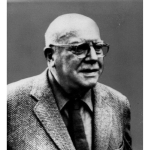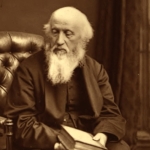When you are not surprised, not surprised,
nor leap in imagination from sunlight into shadow
or from shadow into sunlight
suiting the color of fright or delight
to the bewildering circumstance
when you are no longer surprised
by the quiet or fury of daybreak
the stormy uprush of the sun’s rage
over the edges of torn trees
torrents of living and dying flung
upward and outward inward and downward to space
or else
peace peace peace peace
the wood-thrush speaking his holy holy
far hidden in the forest of the mind
while slowly
the limbs of light unwind
and the world’s surface dreams again of night
as the center dreams of light
when you are not surprised
by breath and breath and breath
the first unconscious morning breath
the tap of the bird’s beak on the pane
and do not cry out come again
blest blest that you are come again
o light o sound o voice of bird o light
and memory too o memory blest
and curst with the debts of yesterday
that would not stay, or stay
when you are not surprised
by death and death and death
death of the bee in the daffodil
death of color in the child’s cheek
on the young mother’s breast
death of sense of touch of sight
death of delight
and the inward death the inward turning night
when the heart hardens itself with hate and indifference
for hated self and beloved not-self
when you are not surprised
by wheel’s turn or turn of season
the winged and orbed chariot tilt of time
the halcyon pause, the blue caesura of spring
and solar rhyme
woven into the divinely remembered nest
by the dark-eyed love in the oriole’s breast
and the tides of space that ring the heart
while still, while still, the wave of the invisible world
breaks into consciousness in the mind of god
then welcome death and be by death benignly welcomed
and join again in the ceaseless know-nothing
from which you awoke to the first surprise.





















Comment form: